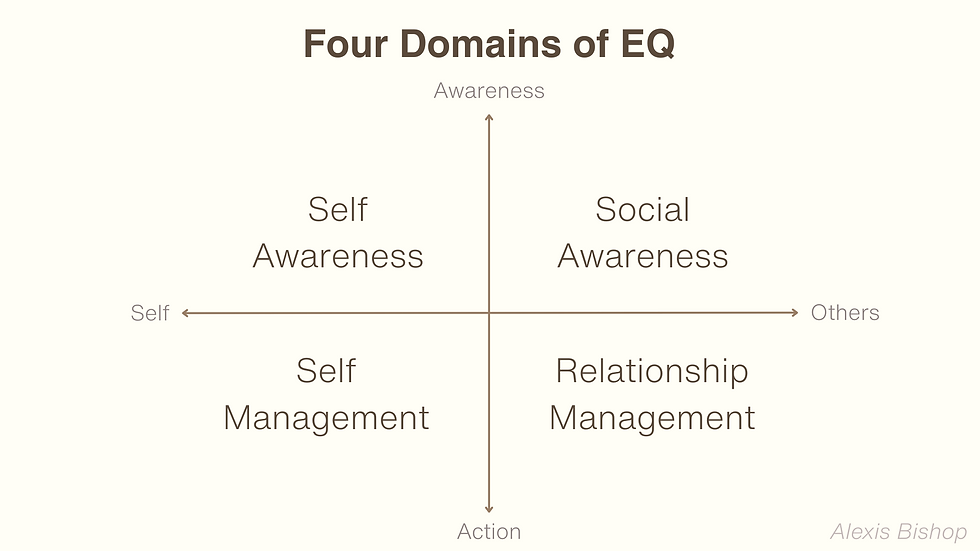Building Emotional Intelligence in the Workplace
- Alexis Bishop

- Apr 16, 2025
- 4 min read
Have you ever worked on a team where everyone communicates effectively and handles challenges with grace? That’s the power of emotional intelligence (EQ) in the workplace. The importance of emotional intelligence is often understated, but it’s one of the most crucial parts of working effectively as a team.
In this blog, I’ll share more about what emotional intelligence is and how you can improve your workplace by building your EQ skills.

What is Emotional Intelligence?
The term “emotional intelligence” has been used by scholars for decades, but one of the most well-known definitions was proposed by Dr. John Mayer and Peter Salovey in 1990. In their research, they described EQ as:
“... the ability to monitor one’s own and others’ feelings and emotions, to discriminate among them and use this information to guide one’s thinking and actions.”
They also said that emotionally intelligent people are skilled in four areas:
Identifying emotions
Using emotions
Understanding emotions
Regulating emotions
By focusing on these four areas, you can build up your EQ.
But why is having a high EQ so important in the workplace anyway?
It’s simple: teams with high EQ are better able to communicate and resolve conflicts as they arise. Instead of fearing potential emotional backlash, team members can propose solutions and navigate change with grace and understanding. These strong interpersonal relationships encourage further teamwork and leadership skill development, ultimately cultivating a positive work environment.
The Four Domains of Emotional Intelligence
There are four primary domains of emotional intelligence, which are shown in this illustration:

To sum it up, emotional intelligence runs on a spectrum between the self and others, and between awareness and action.
Self-Awareness
Self-awareness comes from tuning into our emotions and determining how they impact our performance. Only by first recognizing our own emotions can we begin truly understanding the emotions of others. To be fully self-aware, we need to be able to recognize our own:
Emotions
Strengths
Weaknesses
Values
Drives
Recognize that emotional awareness is a pathway leading directly to your actions. Our feelings influence our thoughts, which influence our actions, which then influence our reactions to others. This can impact our relationships with others, so it’s important to self-assess regularly.
Self-Management
Self-management is tied to regulating our emotions. Recognizing is a great first step, but knowing how to rein them in as needed is just as important.
Consider topics that may trigger strong emotions. How do you handle these emotions in the moment? Being aware of these situations and thinking ahead about how to manage your strong emotions can help you in the moment. Remember to pause, breathe, and reflect before responding to someone, whether in person or by email.
Social Awareness
Social awareness involves tuning into others’ emotions and showing empathy. By being able to put ourselves in others’ shoes, we can better understand them and respond to them with what they need.
It’s also important to consider organizational awareness in your workplace. Pay attention to any emotions, relationships, or social power dynamics that are often unspoken. Taking these into consideration is key for responding appropriately to emotional interactions in the workplace.
Relationship Management
Finally, relationship management has to do with the effectiveness of our interactions and influence with others. Our response to others’ emotions plays a major part in the development of those key relationships.
There is a major connection between self-management and relationship management. You need to understand yourself to understand others! People want to work with others who understand them and navigate conflicts with that human understanding.
The more emotionally regulated you are, the more effective and thoughtful your response will be to others. The clearer and more regulated your communication is, the stronger your relationships will be.
Strategies to Build Your EQ
There are several things you can do to start building your emotional intelligence. Here are just a few to get you started:
Reflective Journaling: Think about times you’ve had strong emotions at work. Write about how you felt and how you handled those emotions (or, how you should have handled them).
Empathy Mapping: Practice putting yourself in other people’s shoes using empathy maps.
Practice Active Listening: Listen to understand, not to respond.
Engage in Self-Care: You can’t pour out of an empty cup! Take care of yourself so you can better understand and care for others.
Reframe Positively: Try to see the light at the end of the tunnel – what good can arise from a challenging situation, such as a lesson learned?
Remember Your Support System: We all have a support system – rely on these people when you need advice or a helping hand.
Final Thoughts
Emotional intelligence is key to creating a healthy and effective workplace. Though building your EQ doesn’t happen overnight, small daily efforts through self-reflection and active listening can make a big difference over time.
Interested in learning more about emotional intelligence? Reach out today for my coaching and development services. I would love to help you or your team strengthen your EQ!



Comments